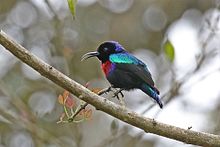
The beautiful sunbird, formerly placed in the genus Nectarinia, is a sunbird. It is native to tropical Africa, its range extending from Senegal and Guinea in the west to Sudan, South Sudan, Ethiopia, Tanzania and Kenya in the east.

The garden sunbird, previously known as the olive-backed sunbird, is a species of passerine bird in the family Nectariniidae that is found in the Philippines except on the Palawan island group. It was formerly considered to be conspecific with seven other species: the ornate sunbird, Palawan sunbird, Sahul sunbird, Tukangbesi sunbird, Flores Sea sunbird, South Moluccan sunbird and the Mamberamo sunbird. It is a small, brightly coloured bird with olive-green plumage on the wings and back with a bright yellow chest. It has a long downward-curved bill it uses for taking nectar and capturing insects. It is primarily nectarivorous, but will take insects and spiders, particularly when feeding chicks.

The purple sunbird is a small bird in the sunbird family. It occurs in parts of the Arabian peninsula and South and Southeast Asia. It has a fast and direct flight and can take nectar by hovering like a hummingbird but often perches at the base of flowers. It feeds mainly on nectar and insects, especially when feeding young. The males can appear all black in harsh sunlight but the purple iridescence is visible on closer observation or under good light conditions. Females are olive above and yellowish below.

The variable sunbird or yellow-bellied sunbird, formerly Nectarinia venusta, is a sunbird. The sunbirds are a group of small Old World passerine birds which feed largely on nectar, although they will also take insects, especially when feeding young. Flight is fast and direct on their short wings. Most species can take nectar by hovering like a hummingbird, but usually perch to feed most of the time.
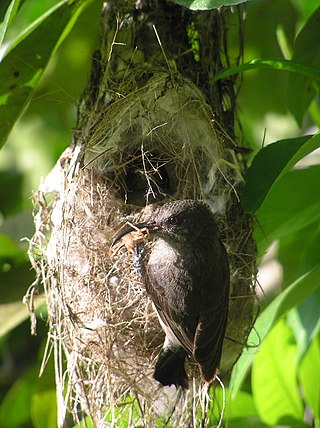
The Seychelles sunbird is a small passerine from the sunbird family. It is named after the French explorer Jean-Jacques Dussumier. It is native to the Seychelles, where it is known as kolibri in Seychellois Creole. This bird is placed in the genus Cinnyris by some authorities and in Nectarinia by others. Although this bird has a limited range, it is described as common and has a stable population, so the International Union for Conservation of Nature has rated its conservation status as being of "least concern".
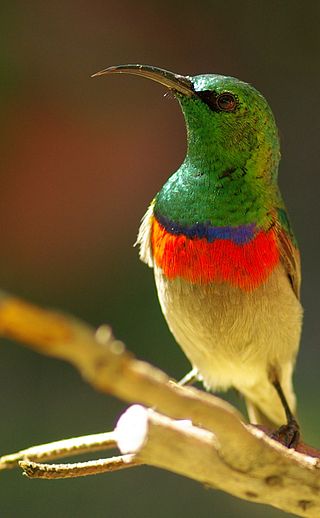
The southern double-collared sunbird or lesser double-collared sunbird is a small passerine bird which breeds in southern Africa. It is mainly resident, but partially migratory in the north-east of its range.

The Palestine sunbird is a small passerine bird of the sunbird family, Nectariniidae. Found in parts of the Middle East and sub-Saharan Africa, it is also known as the orange-tufted sunbird, a name also used for the similar Cinnyris bouvieri, found further south in Africa. In 2015, the Palestinian Authority adopted the species as a national bird, after losing in Israel's national bird public vote in 2008. The specific name osea is derived from Ancient Greek ὁσια.

Bates's sunbird is a species of sunbird in the family Nectariniidae which occurs in Western African forests and Central African rainforests, and locally in other types of forest in Central Africa.
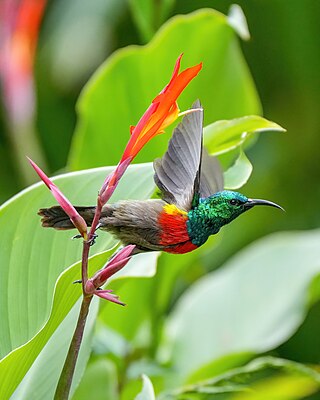
The olive-bellied sunbird is a species of bird in the family Nectariniidae. It is widely spread across the African tropical rainforest.

The copper sunbird is a species of passerine bird in the family Nectariniidae. It is native to tropical Africa, its range extending from Senegal and Guinea in the west to South Sudan and Kenya in the east, and southwards to Angola, Zambia, Zimbabwe and Mozambique.

The shining sunbird is a species of bird in the family Nectariniidae.

Humblot's sunbird is a species of bird in the family Nectariniidae. It is endemic to the islands of Grand Comoro and Mohéli in the Comoros.

The eastern double-collared sunbird is a species of bird in the family Nectariniidae. It is found in upland areas of Kenya and northern Tanzania.

The tiny sunbird is a species of bird in the family Nectariniidae. It is sparsely distributed across the African tropical rainforest.
Moreau's sunbird is a species of bird in the family Nectariniidae. It is endemic to Kilolo District of Morogoro Region in Tanzania where its natural habitat is subtropical or tropical moist montane forests. It is threatened by habitat loss and the International Union for Conservation of Nature has assessed it as being "near-threatened".

The black-bellied sunbird(Cinnyris nectarinioides) is a small sunbird located primarily in Africa. Two subspecies are recognized: the Cinnyris nectarinioides erlangeri, which is smaller and found in Ethiopia, Somalia, and Kenya; and the Cinnyris nectarinioides nectarinioides, which is larger and found in Kenya and Tanzania. This bird inhabits savannah, wetlands, and terrestrial freshwater areas.
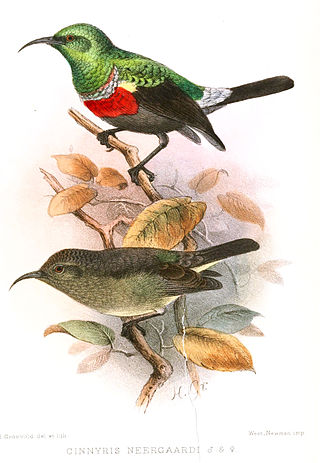
Neergaard's sunbird is a species of bird in the family Nectariniidae. It is found in Mozambique and South Africa. Its natural habitat is subtropical or tropical dry forest near the coast, where it is threatened by habitat loss. It is named after Paul Neergaard, a Danish recruiting officer for the Wenela agency, who was stationed in southern Mozambique.

The northern double-collared sunbird, is a species of bird in the family Nectariniidae. It is found in Burundi, Cameroon, Central African Republic, Democratic Republic of the Congo, Equatorial Guinea, Kenya, Nigeria, Rwanda, South Sudan, and Uganda.

Cinnyris is a genus of sunbirds. Its members are sometimes included in Nectarinia. They are generally known as double-collared sunbirds because the fringe of their bib usually includes a band of contrastingly coloured feathers.
